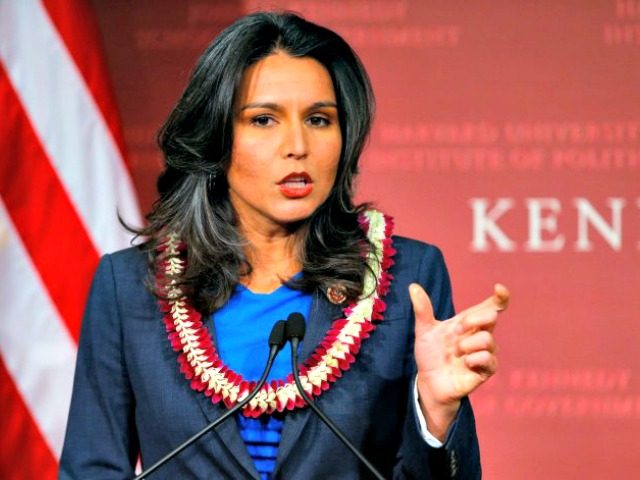On Tuesday, Rep. Tulsi Gabbard (D-HI) wrote an email to The Hill, pushing back against criticism of her criticism of President Donald Trump’s missile strike in Syria.
The Hill chopped the headline down to “We Need to Learn From Iraq,” even though what Gabbard actually said was, “We need to learn from Iraq and Libya,” questioning not only President George W. Bush’s policy in Iraq but the Obama administration’s intervention in Syria.
The main thrust of Gabbard’s email to The Hill is an argument against military intervention. She evidently used the email to lay it out in a clean and simple fashion.
“We need to learn from Iraq and Libya – wars that were propagated as necessary to relieve human suffering, but actually increased human suffering many times over,” she wrote.
“I and thousands of my brothers- and sisters-in-arms went to war in Iraq based on false intelligence and lies from our leaders – our president, military, and political leaders. We should have been skeptical then, and we weren’t,” argued Gabbard, an officer in the Hawaiian Army National Guard who served two tours of duty in Iraq.
She also criticized President Trump for failing to seek congressional approval before ordering the missile attack on Syria.
“There is a reason our Constitution gives Congress the power to declare war: we should be shown the evidence and given the opportunity to debate the strategy and sacrifice expected. No leader – of either party, pro or against military intervention – should let our President take us down the path to another regime change war without that debate,” she urged.
Gabbard previously denounced Trump’s “escalation” of U.S. involvement in Syria as “short-sighted,” warning that it would lead to “more dead civilians, more refugees, the strengthening of al-Qaeda and other terrorists, and a possible nuclear war between the United States and Russia.”
She has also promised to call for Assad’s “prosecution and execution by the International Criminal Court” if he can be proven guilty of using chemical weapons against his own civilians, although she added that the U.S. attack on Sharyat airbase might have made a conclusive investigation impossible.
The Hill chose not to reprint Gabbard’s email in its entirety, so it is not clear if she acknowledges that some of the pushback she is pushing back against is directed at her indulgence of conspiracy theories that exonerate Syrian President Bashar Assad of responsibility for the chemical weapons deployment in Idlib province last week.
She has also been criticized for visiting Syria and meeting with Assad. “Whatever you think about President Assad, the fact is that he is the president of Syria. In order for any peace agreement, in order for any possibility of a viable peace agreement to occur, there has to be a conversation with him,” she said in defense of her actions.
Gabbard said her visits to Syria were motivated by her extreme commitment to end “this war that has caused so much suffering to the Syrian people, to these children, to these families, many of whom I met on this trip.”
That does not bypass the many controversies swirling around her trip, as capably summarized by the Lawfare blog:
She reportedly declined to inform House leadership in advance, met with Bashar al-Assad, toured with officials from a Lebanese political party that actively supports Assad, and received funding from an American organization that counts one of those same officials as its executive director. Moreover, both before and after traveling to Syria, the congresswoman channeled some of Assad’s positions on the war in statements to the public.
One other controversy, naturally the principal one examined by Lawfare, is that Gabbard’s renegade diplomacy with Assad would seem like a fairly blatant violation of the Logan Act – that strangely-worded, dubiously constitutional, never-enforced 1799 law which is supposed to criminalize freelance diplomacy. However moribund the Logan Act might seem, Gabbard should understand that Americans want their government to present a somewhat unified front on the world stage.
Gabbard’s point about the need for congressional authorization has been made, or at least tacitly acknowledged, by other politicians of both parties. Both Democrat and Republican lawmakers criticized President Obama for bypassing Congress when he launched his Libyan intervention, a much larger and more expensive project than anything the Trump administration has currently put on the table for Syria.
On the other hand, skeptics say that most congressional representatives are quietly content with various presidential administrations bypassing their warmaking authority, and thus relieving them of responsibility for difficult and politically inconvenient votes, such as the congressional vote to authorize the Iraq War. As The Hill observes in its post about Gabbard’s email, congressional enthusiasm for insisting upon involvement in further military decisions related to Syria is mixed.

COMMENTS
Please let us know if you're having issues with commenting.